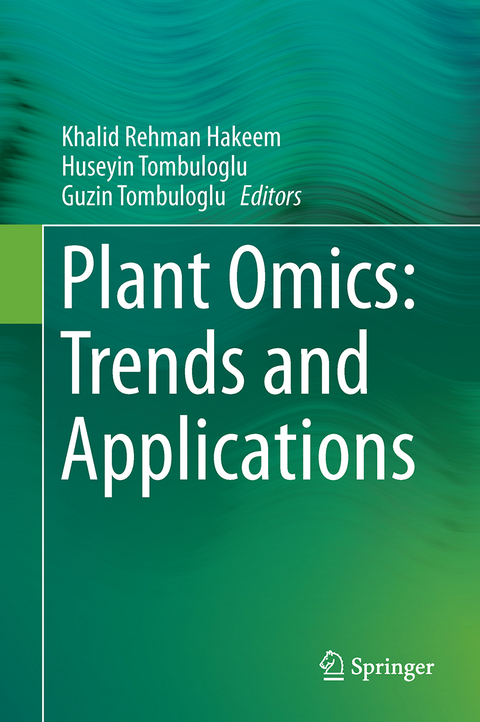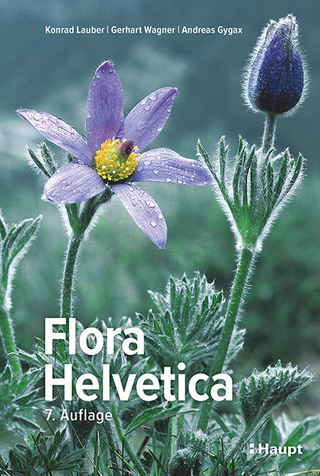
Plant Omics: Trends and Applications
Springer International Publishing (Verlag)
978-3-319-31701-4 (ISBN)
Dr. Khalid Rehman Hakeem (PhD) is working as a Fellow Researcher at the Faculty of Forestry, Universiti Putra Malaysia (UPM), Serdang, Selangor, Malaysia and also a Visiting Professor at Fatih University, Istanbul, Turkey. He has obtained his MSc. (Environmental Botany) as well as PhD (Botany) from Jamia Hamdard, New Delhi, India in 2006 and 2011 respectively. He has conducted his Post Doctorate research in the fields of forest dynamics and plant biotechnological studies from Universiti Putra Malaysia from 2012-2013. Dr. Hakeem has more than Nine years of teaching and research experience in Plant Eco-Physiology, Biotechnology & Molecular biology, Plant-Microbe-soil interactions as well as in Environmental sciences. Recipient of several fellowships at both national and international levels, Dr. Hakeem has so far edited and authored more than sixteen books with International publishers. He has also to his credit more than 70 research publications in peer reviewed international journals, including 30 book chapters with international publishers. He is also the Editorial board member and reviewer of several high impact international Journals. Dr. Hakeem is currently engaged in studying the plant processes at ecophysiological as well as proteomic levels. Dr. Güzin Tombuloglu (PhD) is working as a Assistant Professor at the Pathology Laboratory Techniques Programme of Vocational School of Medical Sciences, Fatih University, Istanbul, Turkey. She has received her MSc.(Biology) degree in 2008 and PhD (Biotechnology) degree in 2014 from Fatih University. She has studied transcriptomics identification of barley boron tolerance mechanism during her PhD. She has experienced several projects on abiotic stress, plant stress responses, Boron toxicity and transcriptomics. She has given several courses on teaching biology education for ten years. She also worked as a Chairman in Pathology Laboratory Techniques Programme and Assistant Manager at Vocational School of Medical Sciences at Fatih University. Dr. Hüseyin Tombuloglu (PhD) ize: 12pt; line-height: 115%; font-family: Arial, sans-serif; background-image: initial; background-attachment: initial; background-size: initial; background-origin: initial; background-clip: initial; background-position: initial; background-repeat: initial;" is working as an Assistant Profesor at the Faculty of Science and Arts, Department of Biology, Fatih University, Istanbul, Turkey. He received his BSc. degree in 2007 from Istanbul University, Department of Molecular Biology and Genetics, Turkey, and also he studied as an exchange student in University of Groningen, the Netherlands. He obtained MSc.(Biology) degree in 2010 and PhD (Biotechnology) degree in 2014 from Fatih University. During this period, he worked on molecular biology of plants, specifically abiotic stresses and the long distance communication of plants via miRNAs. He has awarded several projects supported by TUBITAK (The Scientific And Technological Research Council of Turkey) and BAP (Research Fond of Fatih University). Dr. Tombuloglu has more than eight years of teaching and research experience in Genetics, Molecular Genetics, Plant Physiogy and Biotechnology, as well as Bioinformatics. His current research is focused on the organ-to-organ communication, Boron-stress, and proteomics.
Part 1. Genomics and Transcriptomics.- Genome Analysis of Plants.- Genomics Resources for Plants.- QTL-Analysis in Plants: Ancient and modern perspectives.- Transposon Activity in Plant Genomes.- Next Generation Sequencing: Advantages, Disadvantages and Future.- Molecular Markers and their Applications.- Transcriptomic Responses of Barley (Hordeum vulgare L.) to Drought and Salinity.- miRNA profiling in plants: Current identification and expression approaches.- Identification of gene families using genomics and/or transcriptomics data.- Epigenetics and Applications in Plants.- Next-Generation Sequencing Technologies and Plant Improvement.- Part 2. Proteomics and Metabolomics.- Plant Proteomics- An Overview.- Proteomics of Bamboo-the fast growing grass.- Proteomics-Driven Research of Abiotic Stress Responses in Crop Plants.- Proteomics in Sex Determination of Dioecious Plants.- Metabolome Analysis of Crops.- Plant Metabolomics and Strategies.- Noninvasive methods to support metabolomicstudies targeted at plant phenolics for food and medicinal use.- Part 3. Other Omics fields.- Plant Glycomics.- Technological Platforms to Study Plant Lipidomics.- Plant Interactomics under Salt and Drought Stress.
| Erscheinungsdatum | 08.10.2016 |
|---|---|
| Zusatzinfo | XVI, 514 p. 53 illus., 46 illus. in color. |
| Verlagsort | Cham |
| Sprache | englisch |
| Maße | 155 x 235 mm |
| Themenwelt | Naturwissenschaften ► Biologie ► Botanik |
| Schlagworte | Biomedical and Life Sciences • Biotechnology • genomics • interactomics • Metabolomics • Next generation sequencing • plant biochemistry • plant genetics & genomics • Plant Genetics & Genomics • Plant stress physiology • Proteomics • QTL Analysis • Transcriptomics |
| ISBN-10 | 3-319-31701-6 / 3319317016 |
| ISBN-13 | 978-3-319-31701-4 / 9783319317014 |
| Zustand | Neuware |
| Haben Sie eine Frage zum Produkt? |
aus dem Bereich


